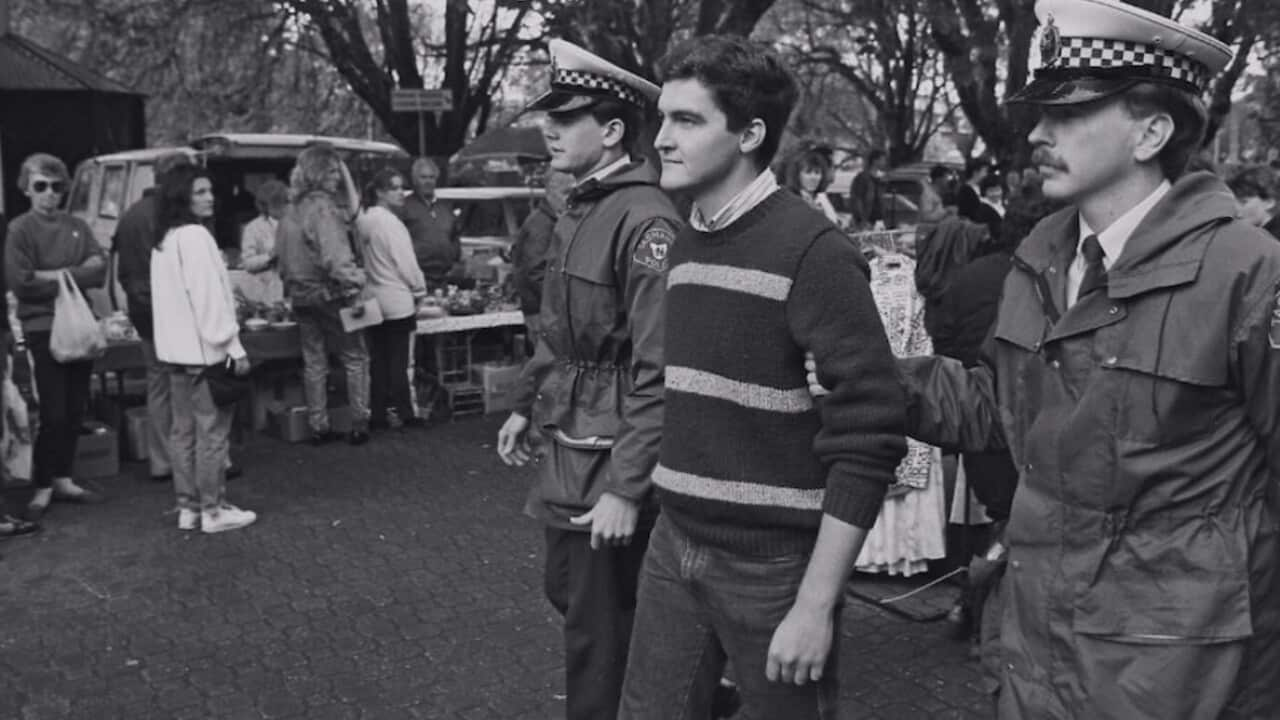This article contains references to suicide/self-harm.
"When are you going to find someone and settle down?"
It's a cliched question that can often be well-meaning, but for people who identify as asexual or aromantic and don't experience either sexual and/or romantic attraction, it can be really painful, Ash McCullough explains.
McCullough identifies as ace, a commonly used shortening of the term asexual, which means they don't experience sexual attraction, "or at least, not to as much of an extent as an everyday person would," they told SBS News.
"It's not something that (ace and aromantic people) can talk about in society at the moment, because there isn't any visibility or any awareness of what it even is.
"So it leads to a lot of shame and sort of hiding, because you are just pretending, saving face and fitting in."
McCullough is from Tasmania, which was dubbed "Bigots' Island" by the British press in the 1990s while a long and bitter debate about homosexuality raged very publicly there.
"I got the sense that I didn't feel that I wasn't the same as everyone else, and that can bring a lot of fear for young people, because a young person's job is to fit in, that's the whole aim of being a teenager is to find your place in the world," they said.
"So when society's telling you, or the messages you're receiving are saying you don't fit in, it can be quite scary."
Advocates have been working hard for a long time to increase awareness and understanding around ace, agender and 'aro' (aromantic) identities and in Tasmania, they've just had a win.
The Tasmanian government has officially expanded the acronym LGBTQIA+ to include the letter "A", to recognise asexual, aromantic, and agender people. The state's reference group will now be known as the LGBTIQA+ Reference Group.
McCullough says this is more than just a symbolic adding of a letter to paperwork.
"Policy is important, but even policy aside, the fact that there's visibility, that the government is saying that we exist, that we are accepted, and we are part of this community sets a precedent for the whole of the state," they said.
McCullough says it will likely have a flow on to creating better policies in state organisations like hospitals and schools.
"Everyone sort of looks to the government to say, what should we be doing here? And I've made a clear statement. Yes. As part of the community, which is fantastic," they said.
Tasmania's Community Services Minister Nic Street said the decision ensures "asexual, aromantic and agender communities have greater visibility, representation and support that they deserve".
"The Tasmanian government's vision is for an inclusive community where all Tasmanians are treated with dignity, respect and without discrimination," he said.
"In line with this vision, we are ensuring that no one feels excluded or left behind."
It's a stark change from the reputation the state gained from being the last to decriminalise homosexuality, which finally happened in 1997.
Tasmania's journey from 'worst to best' for queer rights
The Tasmanian government pivoted relatively quickly to making several country-first decisions to advance queer rights.
Going from "the very worst to the very best in the country" has happened thanks to advocates fighting tooth and nail and through sharing community stories, Equality Tasmania advocate Lucy Mercer-Mapstone told SBS News.
In 1998, Tasmania was the first state to ban discrimination in faith-based schools and services.
The state was the first to enact a civil partnership scheme in 2003, before same-sex marriage's national legalisation in 2017.
It was also the first to recognise overseas same-sex marriages, introduce a state same-sex marriage bill, and pass a bill calling on the federal government to legalise same-sex marriage.
Tasmania's approach to gender non-conforming legislation is among the most liberal in the world.
But it didn't decriminalise cross-dressing after dark, a law that targeted and discriminated against transgender people, until 2001.
But in 2019, it was the first state to make gender optional on birth certificates and allow people, as well as allowing people to change the sex on their birth certificate to align with their gender identity without needing to have medical intervention.
Mercer-Mapstone says Tasmanians have banded together in a sense of strong community to make these changes happen in a way unlike any of the other three states she'd lived in.
"I think it's partially due to our relatively small population, and people have a really strong sense of place," she said.
"Queer activists have been really outspoken and taken the brunt of the homophobia and transphobia of the past to help other people understand and empathise with why it benefits everyone for Tasmania to include LGBTQIA+ people."
Mental health challenges remain
However, this progress doesn't translate neatly to improved mental health outcomes. In the week when the Tasmanian government recognised the A, survey results showed many older LGBTQI+ Tasmanians face serious mental health challenges.
Older queer people in Tasmania were more likely than their mainland counterparts to have suicidal thoughts in the past 12 months or to have attempted suicide in the past 12 months and in a lifetime, according to Australian Institute of Health and Welfare data.
Readers seeking support with mental health can contact Beyond Blue on 1300 22 4636. More information is available at .
supports people from culturally and linguistically diverse backgrounds.













